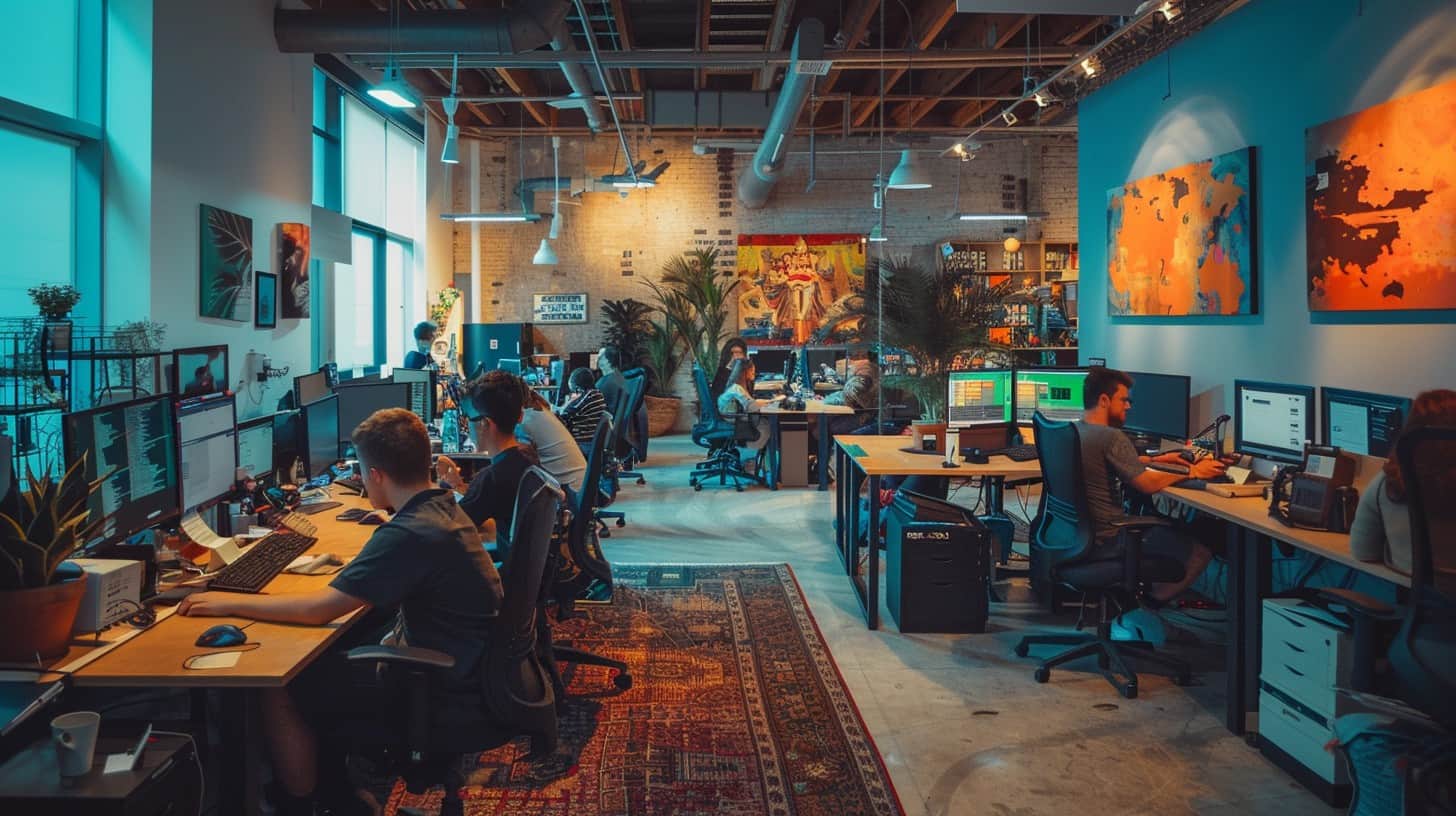Thinking about making games for a living? You might wonder what kind of paycheck that dream can bring. This article breaks down game developer salaries, from the averages to ways you can boost your own earnings.
Time to level up!
Key Takeaways
Game developers’ salaries depend on experience, skills, and location. Starting out, they earn less but can reach over $121,078 with 7+ years of experience.
Knowing programming languages like C#, Java, or Python increases your salary. Other key skills include game design and understanding player psychology.
Salaries are higher in big cities with a high cost of living like San Francisco and New York City. Working for bigger companies often means more benefits.
Gender gaps exist in the industry; men tend to earn more than women. Efforts are needed to close this pay gap.
Game developers have various career paths across industries like IT, media, and entertainment. Skills in game development open doors worldwide.
Table of Contents
The Role of Game Developers

Game developers bring video games to life. They code, create characters, and fix bugs. Their work involves programming languages, game design, and sometimes even video game art. These pros make sure every level plays right, and every quest hooks players.
They team up with graphic designers for visuals and sound engineers for audio.
“Great games are born from great challenges.”
Next up: how influences shape what game developers earn.
Influences on Game Developer Salaries

Many things change how much game makers earn. Where you live, what you know, and how long you’ve been making games all play a big part.
Experience Levels
Game developers swing from noobs to masters in their field. Their journey impacts how much dough they rake in.
- Fresh out of the gate: These folks are just dipping their toes. They might have a bachelor’s degree in computer science or game development under their belt. But real-world experience? Not so much. Their wallets feel it too, with salaries starting lower than their more seasoned pals.
- A bit of dirt on the boots: Now, these game creators have been around the block a couple of times. With about 1–3 years tucked away, they’ve got a better grasp on things like Unreal Engine and debugging those pesky glitches. It shows in their paychecks, which get a nice bump.
- Middle of the road: Sitting cozy with 4–6 years of experience, these devs aren’t rookies anymore but aren’t yet the Yoda of gaming either. They’ve likely worked on several projects and maybe even dabbled in different areas like mobile games or virtual reality. Their salary reflects their growing expertise.
- Seasoned vets: Here come the big guns with 7+ years lighting up their resume. They’ve seen it all—from Counter-Strike mods to indie game marvels and possibly even AAA titles that make gamers’ hearts race. According to those in the know, these veterans can earn an average of $121,078—a tidy sum for wrangling code and bringing virtual worlds to life.
- Top dogs: Picture someone who doesn’t just play the game; they change it entirely. These devs are often behind groundbreaking new technologies and methodologies in gaming, leading teams, pioneering augmented reality experiences or complex AI interactions within interactive games. With this level of responsibility and innovation comes top dollar salary ranges.
Each rung up the ladder isn’t just about putting time in; it’s about leveling up skills—from mastering Gamemaker Studio to understanding gamer lingo inside out—that ultimately powers up a developer’s earning potential.
Expertise Areas
Let’s talk about what makes some game developers stand out from the crowd. Their secret sauce? Areas of expertise that hook big bucks.
- Skills in Programming Languages – If you know C#, Java, Python, C++, or Javascript, you’re in a sweet spot. I learned Python first, and it was like unlocking a superpower. Games require complex lines of code and these languages are the tools of the trade.
- Mastery in Data Shaping – Being able to model data is crucial. It’s like knowing how to build the skeleton for a game’s universe where every piece fits perfectly.
- Designing Virtual Worlds – Game artists and designers who can create immersive environments are gold. I remember working on my first virtual environment; it felt like painting dreams into reality.
- Sound Crafting – Crafting sound effects and background music that keep players hooked is an art itself. It’s not just about making noise but adding another layer of depth to the gameplay.
- Understanding Player Psychology – Knowing what gamers want and how they think makes a huge difference. It’s all about getting into their heads. Think like them, win their hearts.
- Testing Games’ Durability – Quality assurance experts make sure games don’t break when players least expect it. My first stint as a tester taught me more about patience than anything else.
- Using Artificial Intelligence Smartly – With AI, games learn from players, making each playthrough unique and challenging.
- Building for Various Platforms – From mobile devices to gaming consoles, developers must adapt games for different screens and systems which requires specific expertise.
- Project Collaboration Know-how – Making games is rarely a solo mission; it demands teamwork across disciplines from audio engineering to animation.
- Skills in project – based software development specifically tailored for game creation also dramatically boost your value in this field.
Each area opens new doors in the vast world of game development, promising opportunities that keep careers fresh and exciting long after launching your first modded adventure or branded quest into digital landscapes!
Geographic Impact
The place where a game developer works makes a big difference in their pay. Cities with lots of tech companies often pay more. Here’s how geography shapes what game developers earn:
- Big cities, bigger checks: In tech hubs like San Francisco and New York City, salaries soar. I once met a developer in San Francisco who made $156,500 a year. That’s 25% above the average! These places have more game studios and tech firms hungry for talent.
- The cost of living connection: High salaries often match high living costs. A friend working in Princeton told me his paycheck felt smaller after paying for his apartment and groceries. It’s like getting a giant cookie but having to share most of it.
- West Coast wins: The U.S. Bureau of Labor Statistics shows places like Seattle and Los Angeles also offer hefty sums to game developers. It’s not just the sun and surf attracting folks but the promise of fat paychecks too.
- Company size matters: Big fish or small pond? Large companies often have deeper pockets than startups or indie studios. But, smaller places can offer unique opportunities to work on varied projects or earn shares that could pay off big time.
- Not just about games: Industries beyond gaming need developers too, affecting where jobs are located and how much they pay. From web development to virtual environments for training, skills in game development open doors worldwide.
Now, let’s talk about dough within the U.S.—how salaries change from one city to another can blow your mind!
Game Developer Salaries in the US

In the US, game developers can earn a wide range of salaries. Some folks take home big paychecks, while others make a more modest amount. It all depends on where they work and how skilled they are.
Cities like San Francisco and New York often offer the highest salaries because living there costs more. Plus, bigger companies usually pay more than smaller ones. If you’re curious about making games your career, peeking into these salaries might just spark your ambition to level up your skills!
Salary Overview
So, you want the scoop on game developer salaries? Straight to the point: these tech wizards can earn quite a packet. Their pay reflects their skill in turning coffee into code that millions enjoy. Let’s lay out the numbers in black and white.
| Salary Component | Average | Median | Range |
|---|---|---|---|
| Base Salary | $116,189 | $115,000 | $63,299.66 – $199,721.33 |
| Extra Cash | $4,724 | – | – |
| Total Compensation | $120,913 | $115,000 | $4,000 – $214,000 |
| Profit Sharing & Bonuses | $23,376.15 | – | – |
Remember, these figures can swing widely based on many factors. City life often means more cash in your wallet. San Francisco and New York City led the pack in generosity. Next, we’ll peek into what influences these numbers even more.
Highest Paying Cities
After peeking at the salary overview, it’s time to zoom in on where game developers pocket the most dough. Spoiler alert: location matters a lot.
Here’s a quick look at the top cities rolling out the red carpet for game developers. Spoiler: some names on this list might just surprise you.
| City | Average Salary |
|---|---|
| San Francisco | $156,500 |
| Princeton-Trenton | $136,000 |
| New York City | $136,000 |
| Seattle | Not specified |
| Los Angeles | Not specified |
Ever wondered why some cities offer bigger paychecks? A lot boils down to living costs. It’s pricier to live in San Francisco than in most parts of the country. Companies know this. They pay you more to make the high costs manageable. It’s like they’re saying, “We get it. Rent’s crazy. Here’s a bit more to help out.”
But it’s not just about surviving high costs. Bigger cities often host more companies, especially tech giants and cutting-edge game studios. These places compete for the best talent. How? By waving bigger salaries.
My first gig in game development landed me in a smaller city. The paycheck was okay. Not amazing. Then I moved to San Francisco. Trust me, seeing that salary bump was like upgrading from a bicycle to a sports car. Overnight, my earnings shot up. Why? The demand for game developers in tech hubs is off the charts.
So, if you’re eyeing a fat paycheck, consider aiming for a role in one of these cities. It could mean not just more cash, but also working on bigger projects with more resources. That said, remember to weigh the pros and cons. A bigger salary in San Francisco might still feel tight due to the high cost of living.
Where you play the game development game can massively affect how much you take home. Choose wisely!
Influence of Company Size
The size of a company can really shake up how much game developers make. Big companies and tiny teams don’t always dish out cash the same way. Let’s lay it out in a simple table so you can see what I mean:
| Company Size | Average Salary |
|---|---|
| 1–10 employees | $146,267 |
| 11–50 employees | Varies, but generally less |
| 50+ employees | More benefits, different perks |
Working at a tiny startup or a small indie game studio has its perks. I once joined a team of nine people. Trust me, the feeling of closeness and the chance to wear many hats was unmatched. But the biggest surprise? The paycheck. With fewer folks, there’s often more pie to go around. That’s why folks in these small teams might see numbers like $146,267 on their W-2.
But it’s not just about the raw cash. Smaller outfits might not always match the benefits or stability you’d find in a larger corporation. Yet, they often offer more flexibility and a chance to really leave your mark on the project. Think of it as trading a bit of security for a potentially bigger payoff and more creative freedom.
On the flip side, joining a larger company doesn’t always mean a bigger salary upfront. But it comes with its own set of perks. Think health benefits, retirement plans, and more. Plus, being part of a larger team means access to more resources and possibly even mentorship opportunities. It’s like choosing between a nimble speedboat or a steady cruise ship.
Both paths have their ups and downs. Your choice might boil down to what you value more. Is it the thrill of startups or the stability of established companies? Either way, understanding the influence of company size can help you navigate the seas of game development with a bit more savvy.
Salary Disparities Among Game Developers

Not every game creator takes home the same paycheck. Factors like your gender and where you live can make a big difference in how much money you earn.
Gender-Based Differences
Let’s shed some light on the gender-based differences in game development pay. It’s a hot topic, and for good reason. So, without beating around the bush, here’s the lowdown, served on a silver platter in the simplest HTML table you’ve probably seen in a while.
| Gender | Average Salary |
|---|---|
| Women Game Developers | $102,074 |
| Men Game Developers | $126,107 |
Tough numbers to swallow, right? The gap is wider than a canyon. Men, on average, take home a bigger paycheck than women in the game development arena. This disparity isn’t just a number thing; it’s a signal that change is needed. Education, experience, and where you live play a role. But, let’s not forget the elephant in the room. We’re talking about a field where keyboards clack and ideas sparkle, yet something as basic as equal pay hasn’t been leveled up.
The journey to balancing the scales is more marathon than sprint. It requires action, not just talk. So, if you’re feeling the heat, remember, it’s not just about coding your way out. It’s about knowing your worth and joining forces to rewrite the rules of the game. And hey, who doesn’t love a good underdog story? Let’s make it happen.
Salary Variation
Beyond gender gaps, game developer earnings swing wildly due to other factors. The cash you pocket can depend heavily on where you live. In some cities, living costs push wages up.
Meanwhile, in others, you might earn less but enjoy cheaper living expenses. It’s like the difference between scoring a bonus level in your favorite modded game or hitting an unexpected glitch that slows you down.
Your salary is not just a number; it’s a story of where you are and what you’ve mastered.
Expertise areas also shuffle the deck of potential earnings. A whiz at video game design might rake in more than someone specializing only in game testing. Picture aiming for higher levels in your career like leveling up in a game—the more skills and experience points you gather (think software engineering or mastering data structures), the better your chances of hitting those top-tier salaries reported by sources like the U.S. Bureau of Labor Statistics.
And if you’re curious about who writes the checks that fuel our gaming worlds—game development studios, tech firms, and even advertising agencies are on the lookout for talent that can turn ideas into engaging gameplay experiences.
Career Paths for Game Developers

Game developers have many doors open for them, not just in game studios. They can create worlds in video games, design apps that keep us glued to our screens, or even make ads more fun to watch.
Hiring Industries for Game Developers
So you want to become a game developer? Guess what, the gaming industry is booming, and there’s room for more. Let’s talk about where your skills can shine bright like a diamond in the rough.
- Information Technology (IT): This world runs on computers and software. Game developers here work on crafting interactive experiences that blow our minds. You could be making the next big app or designing software that uses gaming to teach coding.
- Media & Communication: Ever thought of creating games that tell stories? Here, game developers blend narrative and gameplay to keep users hooked. Whether it’s through mobile platforms or web browsers like Firefox, your games could reach millions.
- Human Resources & Staffing: Sounds odd, right? But gamification is changing how companies train and engage their staff. Your role might involve developing interactive training modules or team-building games.
- Arts, Entertainment & Recreation: The heartland of video game development. Work in studios focused on everything from console games to mobile gaming hits. Bring characters to life as an animator or craft worlds with jaw-dropping graphics.
- Management & Consulting: Companies need game developers for brand awareness campaigns and product launches. Imagine creating a game that introduces a new sneaker line or a modded game that goes viral.
These industries are hunting for talents like you – from sound designers who make audio magic to systems engineers who ensure everything runs smoothly behind the scenes.
Next up, let’s dive into opportunities waiting in different types of companies!
Opportunities in Game Studios
Game studios are like playgrounds for the creative mind. Here, ideas turn into virtual adventures that capture hearts worldwide. Let’s explore what doors can swing open for you in a game studio.
- Dive into game design. You get to sketch out the game’s world, dreaming up everything from shadowy forests to bustling cityscapes. It’s where your doodles become the places millions will explore.
- Work as a programmer. These wizards turn coffee into code, bringing life to our game designs with their spells of C++ or Python. If making characters move and creating worlds from lines of text excites you, this is your calling.
- Join as an animator. Imagine giving motion to monsters and heroes alike. Your animation breathes life into static images, making them run, fight, and dance across the screen.
- Become a game tester. This job lets you play games before anyone else, looking for bugs and ensuring everything runs smoothly. It’s like being the gatekeeper of fun, ensuring only the best experiences make it through.
- Lead as a project manager. Someone needs to steer the ship and keep all these creative minds on course. Project managers make sure deadlines are met and everyone has what they need to succeed.
- Project management involves guiding your team through thick and thin while keeping an eye on budgets and schedules.
- Engage in audio engineering work where you’ll create sound effects that make worlds feel alive or compose music that will stick with players long after they’ve stopped playing.
- Delve into marketing roles within the studio could see you hyping up releases through engaging campaigns that charm players everywhere
- In some studios, there’s even room for writers who craft narratives that players will lose themselves in for hours on end.
- Last but not least, quality assurance specialists play a critical role in polishing the final product ensuring gamers have an excellent experience from start to finish.
After learning all about opportunities in game studios, let’s look at how these roles come together to launch some of the most exciting video games on the market.
Roles in Tech Companies
After exploring game studios, let’s dive into the roles tech companies offer. These positions let you bring your favorite games to life in new ways.
- Software Engineers: You’ll write code that makes games work. Imagine turning your idea for a cool game feature into reality.
- Video Game Designers: This role lets you plot the game’s journey. You decide what happens, designing challenges and victories for players.
- Animators: Bring characters to life with animation. Your art moves and interacts, thanks to your skills.
- Quality Assurance Analysts: Test games to find bugs. You play parts of a game many times to make sure everything works well.
- Programmers for Artificial Intelligence: Work on AI that makes games smart. Enemies react, and virtual worlds evolve because of what you program.
- User Experience Designers: Make sure playing the game feels good. You focus on layout and how easy it is for players to understand the game.
- Audio Engineers: Create sounds that make games immersive. From footsteps to explosions, your work hooks players with every noise.
Each role has its magic. They all contribute to creating experiences that gamers love. Your skills can shine in any of these positions if you have passion and creativity.
Careers in Advertising Agencies
Game developers are not just stuck in game studios; they spread their magic in tech companies and advertising agencies too. Working in an advertising agency opens up a whole new playground for creative minds like you.
Crafting Winning Ads: In an advertising agency, game developers use their skills to make ads come alive. Think animations that grab your attention and games that are part of an ad. I once worked on a campaign where we developed a mini-game. It let people interact with the product in a fun way, boosting the ad’s appeal.
Bringing Stories to Life: Your job might be to turn narratives into engaging experiences. This could mean creating animated stories or interactive content that tells a brand’s tale. Imagine making characters from ads jump off the screen and into a game scenario where users can play with them.
Tech Wizardry Behind the Scenes: Agencies often need tech-savvy brains to manage behind-the-scenes magic like explainable AI or software that tracks how well an ad does. You’ll get to play around with cool gadgets and software, ensuring ads hit the mark every time.
Collaboration Is Key: Game developers in advertising agencies work closely with graphic designers, copywriters, and marketing pros. Together, you brainstorm ideas that mix game mechanics with compelling messages for brands. It’s all about teamwork here – your coding skill meets their creativity.
Innovation at Its Best: Expect to push boundaries and think outside the box daily. Advertising agencies love fresh ideas that set trends rather than follow them. It could be using VR to immerse people in a brand story or crafting an interactive billboard ad.
Learning on the Go: In this role, you’re always picking up new tricks – whether it’s mastering new programming languages or understanding consumer psychology better. There’s never a dull moment as you figure out how to make ads more engaging through games.
Networking Nirvana: Remember, building a network of contacts can open doors to new opportunities or higher-paying positions within this space too! Meet folks from various departments and even other agencies at events or online forums.
Workshops Galore: One great thing is getting sent to workshops frequently asked questions about everything – from modded games to cutting-edge technology used in today’s ads.
Imagine combining your passion for gaming with the fast-paced world of advertising! Each day is different, and your creative input helps shape how brands connect with people globally through games and animation within their advertisements.
Enhancing Game Developer Salaries

Want to make more money making games? It’s all about leveling up your skills. Learn what moves can boost your game developer paycheck—like mastering new programming languages or getting savvy with the latest software tools.
Plus, don’t forget to connect with others in the gaming world. More tips are waiting for you, so keep reading and power up your career!
Skills and Certifications
Boosting your game developer salary can feel like leveling up in your favorite RPG. You need the right skills and badges to show you’re a master of the craft. Here’s how to gear up.
First off, mastering programming languages is like learning spells for a wizard. These are must-have tools in your kit:
- C++#: This is the magic wand for Unity, one of the leading engines for game creation. I spent countless nights casting lines of C# code, conjuring game mechanics that felt alive.
- Java: It’s not just for web developers. Mobile games thrive on Java. My first break into game development was tweaking Java codes for an indie mobile game.
- Python: Think of it as your utility spell. From scripting simple tasks to handling complex game logic, Python keeps things running smoothly behind the scenes.
- C++: The ancient language of high-performance computer sorcery. Learning C++ unlocked doors to big studios for me because it powers many AAA titles.
- JavaScript & Data Modeling: For online games or those with hefty data analytics, these skills are golden. They help create experiences that keep players coming back.
Gaining certifications can also boost your credibility:
- A bachelor’s degree in computer science is more than a piece of paper; it’s proof you’ve mastered the fundamentals. Every quest starts here.
- Special certifications in Unity or Unreal Engine showcase your prowess in these realms. I bagged my first lead developer role after getting certified in Unreal Engine – it was like adding a rare item to my inventory that made guilds (employers) take notice.
The journey doesn’t stop with acquiring new skills:
- Engaging in real projects through internships can be as revealing as any epic quest. It shows potential employers you’re battle-tested.
- Lastly, attending workshops and seminars gives you insight into cutting – edge technologies and methodologies.
Plugged into the right network can turn job quests into epic team-ups with fellow devs and industry mentors.
Let’s now shift gears and explore how internships open doors to magical opportunities in the gaming world.
Internship Benefits
Landing an internship is like finding a golden ticket. It opens doors to the vast world of game development. Here are the perks that come with it:
- Real – world experience – Interns dive into projects that challenge them. They learn by doing, which is way better than just reading about it.
- Skill sharpening – From coding to designing, interns enhance their abilities. They work on actual games, picking up new techniques along the way.
- Portfolio boost – Every project completed during an internship adds to an intern’s portfolio. This showcases their talents to future employers.
- Industry connections – Interns meet pros who have been in the game for years. These contacts can prove invaluable later in their careers.
- Job readiness – By working on real tasks, interns understand what companies expect from them. This makes transitioning into a full-time role smoother.
- Insight into specializations – Interns explore different areas within game development. They find out what they love and what they’re good at.
- Competitive edge – With hands-on experience and a solid network, interns stand out from the crowd when applying for jobs.
Each of these benefits helps build a strong foundation for a career in game development. An internship not only polishes skills but also paves the way for future opportunities.
The Power of Networking
Just like internships can kick-start your career, a strong network is your ladder to climb higher in the game development world. It’s all about who you know and how you connect with them. Here’s why networking is a game-changer for every game developer out there.
- Go to industry events and conferences: This is where the magic happens. I once met a lead designer at a conference who later introduced me to my current boss. These events are gold mines for meeting people who are eager to share advice, insights, and sometimes, job openings.
- Create a portfolio: Show off your projects on platforms like GitHub or Behance. A well-crafted portfolio can spark conversations that might lead to job offers or collaborations. Think of it as your silent advocate in the network arena.
- Use social media wisely: LinkedIn isn’t just for profile pics and resumes. Share your work, ask questions, join discussions, and follow companies you admire. Twitter can be a clubhouse for finding mentors or peers with similar interests.
- Offer help: Networking isn’t just taking; it’s also giving back. Volunteer for projects or offer your coding skills to solve problems in forums like StackOverflow. Helping others puts you on their radar as someone valuable and reliable.
- Attend workshops: Not only do you learn new skills, but workshops also put you in rooms with professionals sharing your enthusiasm. It’s an easy icebreaker when you’re learning together.
- Networking groups and clubs: Joining groups dedicated to game development can expand your circle beyond immediate contacts. It’s here that I found two of my closest colleagues; we were all looking for study buddies for a certification exam.
- Emails and messages matter: Don’t hesitate to reach out to people whose work you admire with thoughtful emails or messages on professional networks. Most professionals respect genuine admiration and curiosity about their work.
- Follow up: Met someone interesting at an event? Send them a message recalling your conversation and expressing interest in staying connected. People remember those who show genuine interest.
This web of connections builds over time but starts yielding opportunities sooner than one might expect—be it learning from seasoned developers’ experiences or landing jobs that aren’t advertised publicly.
FAQs About How Much Game Developers Make
What’s the deal with game developer salaries?
Game developers, like any artists in the tech world, can earn a pretty penny! Your paycheck depends on your work experience and whether you’re a hotshot game programmer or just starting out. Think of it as leveling up in a video game; the more skills and levels you have, the more gold coins (or dollars) you collect.
Does going to school for this stuff really pay off?
Absolutely! Picture formal education as your secret weapon or power-up in the gaming world. Software developers with degrees often see their earnings jump because they’ve got that extra sparkle on their resume. It’s like having an exclusive armor set in an RPG – it sets you apart from the crowd.
Can I make more money if I learn some special tricks?
You betcha! In this game, knowledge is not just power; it’s profit too. Picking up new programming languages or mastering cutting-edge software could catapult you into a higher salary percentile faster than a speedrun through your favorite level.
Any financial advice for someone just starting out as a game developer?
Think of saving money like collecting rare items; start early and do it often. Even though those first few checks might have you feeling rich, plan ahead! Invest in yourself by learning new skills and maybe stash some cash away for future projects or training—think of it as grinding to prepare for the boss battle of retirement.



